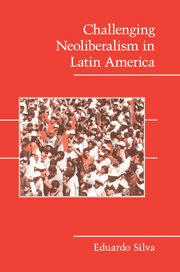Book contents
- Frontmatter
- Contents
- List of Tables
- Preface and Acknowledgments
- List of Acronyms
- 1 THE INCONVENIENT FACT OF ANTI-NEOLIBERAL MASS MOBILIZATION
- 2 CONTENTIOUS POLITICS, CONTEMPORARY MARKET SOCIETY, AND POWER
- 3 THE ARGUMENT: EXPLAINING EPISODES OF ANTI-NEOLIBERAL CONTENTION IN LATIN AMERICA
- 4 ARGENTINA
- 5 BOLIVIA
- 6 ECUADOR
- 7 VENEZUELA
- 8 PERU AND CHILE
- 9 CONCLUSION
- References
- Index
5 - BOLIVIA
Published online by Cambridge University Press: 05 June 2012
- Frontmatter
- Contents
- List of Tables
- Preface and Acknowledgments
- List of Acronyms
- 1 THE INCONVENIENT FACT OF ANTI-NEOLIBERAL MASS MOBILIZATION
- 2 CONTENTIOUS POLITICS, CONTEMPORARY MARKET SOCIETY, AND POWER
- 3 THE ARGUMENT: EXPLAINING EPISODES OF ANTI-NEOLIBERAL CONTENTION IN LATIN AMERICA
- 4 ARGENTINA
- 5 BOLIVIA
- 6 ECUADOR
- 7 VENEZUELA
- 8 PERU AND CHILE
- 9 CONCLUSION
- References
- Index
Summary
Like that of Argentina, Bolivia's episode of anti-neoliberal contention spanned three distinctive waves. In the first one, shocked and desperate traditional unions protested President Víctor Paz Estenssoro's (1985–89) New Economic Policy and its consolidation under Jaime Paz Zamora (1989–93). They were defeated. In the second wave, President Gonzalo Sánchez de Lozada (1993–97) deepened neoliberal reforms, sparking a new wave of mobilization. Although the government contained protest, portentous changes occurred in the development of popular sector associational and collective power. The third wave began during the Hugo Bánzer–Jorge Quiroga (1997–2002) administration and crested in Sánchez de Lozada's second presidency (2002–3). Important declines in the economic and political power that sustained neoliberalism and transformations in the associational and collective power of challengers culminated in massive nationwide demonstrations that forced Sánchez de Lozada to resign. After a brief caretaker government, Bolivians elected center-left President Evo Morales in 2005.
One difference with all cases and several with Argentina shaped anti-neoliberal contention in Bolivia. Bolivia, unique in South America, experienced a major social revolution in 1952. As a result, it had a veteran, highly militant, and – unlike Argentina – independent labor confederation. Bolivia was much poorer than Argentina, with a far less diversified and industrialized economy based on mineral extraction. Thus even modestly successful neoliberal reform could not dampen mobilization. Unlike Argentina, Bolivia possessed a large rural labor force with a relatively traditional peasantry in the highlands and proletarian rural workers in the lowlands, especially in regions of new development such as Santa Cruz and Beni, where agribusiness flourished.
- Type
- Chapter
- Information
- Challenging Neoliberalism in Latin America , pp. 103 - 146Publisher: Cambridge University PressPrint publication year: 2009



